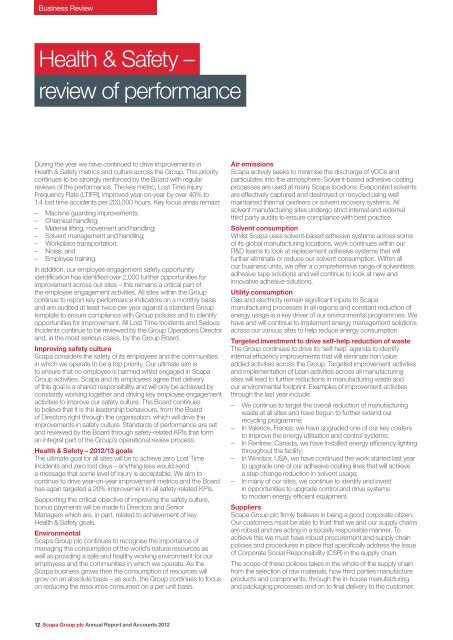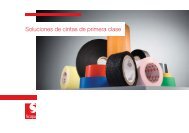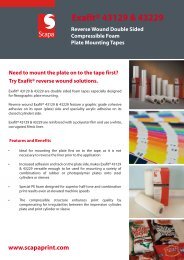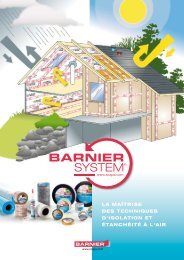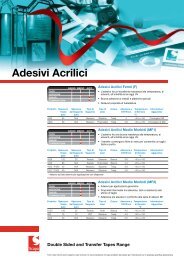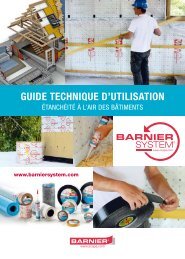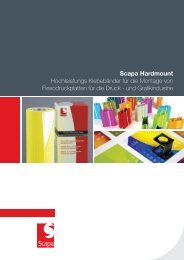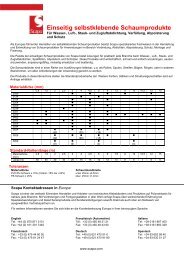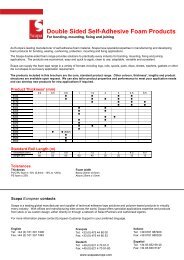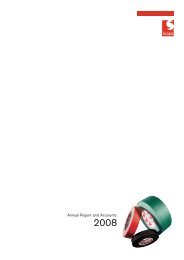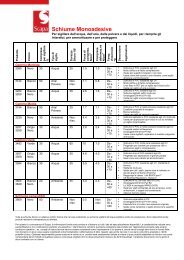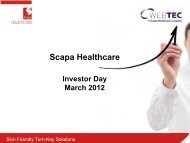Annual Report and Accounts 2012 - Scapa
Annual Report and Accounts 2012 - Scapa
Annual Report and Accounts 2012 - Scapa
You also want an ePaper? Increase the reach of your titles
YUMPU automatically turns print PDFs into web optimized ePapers that Google loves.
Business Review<br />
Health & Safety –<br />
review of performance<br />
During the year we have continued to drive improvements in<br />
Health & Safety metrics <strong>and</strong> culture across the Group. This priority<br />
continues to be strongly reinforced by the Board with regular<br />
reviews of the performance. The key metric, Lost Time Injury<br />
Frequency Rate (LTIFR), improved year-on-year by over 40% to<br />
1.4 lost time accidents per 200,000 hours. Key focus areas remain:<br />
– Machine guarding improvements;<br />
– Chemical h<strong>and</strong>ling;<br />
– Material lifting, movement <strong>and</strong> h<strong>and</strong>ling;<br />
– Solvent management <strong>and</strong> h<strong>and</strong>ling;<br />
– Workplace transportation;<br />
– Noise; <strong>and</strong><br />
– Employee training.<br />
In addition, our employee engagement safety opportunity<br />
identification has identified over 2,000 further opportunities for<br />
improvement across our sites – this remains a critical part of<br />
the employee engagement activities. All sites within the Group<br />
continue to report key performance indicators on a monthly basis<br />
<strong>and</strong> are audited at least twice per year against a st<strong>and</strong>ard Group<br />
template to ensure compliance with Group policies <strong>and</strong> to identify<br />
opportunities for improvement. All Lost Time Incidents <strong>and</strong> Serious<br />
Incidents continue to be reviewed by the Group Operations Director<br />
<strong>and</strong>, in the most serious cases, by the Group Board.<br />
Improving safety culture<br />
<strong>Scapa</strong> considers the safety of its employees <strong>and</strong> the communities<br />
in which we operate to be a top priority. Our ultimate aim is<br />
to ensure that no employee is harmed whilst engaged in <strong>Scapa</strong><br />
Group activities. <strong>Scapa</strong> <strong>and</strong> its employees agree that delivery<br />
of this goal is a shared responsibility <strong>and</strong> will only be achieved by<br />
constantly working together <strong>and</strong> driving key employee engagement<br />
activities to improve our safety culture. The Board continues<br />
to believe that it is the leadership behaviours, from the Board<br />
of Directors right through the organisation, which will drive the<br />
improvements in safety culture. St<strong>and</strong>ards of performance are set<br />
<strong>and</strong> reviewed by the Board through safety-related KPIs that form<br />
an integral part of the Group’s operational review process.<br />
Health & Safety – <strong>2012</strong>/13 goals<br />
The ultimate goal for all sites will be to achieve zero Lost Time<br />
Incidents <strong>and</strong> zero lost days – anything less would send<br />
a message that some level of injury is acceptable. We aim to<br />
continue to drive year-on-year improvement metrics <strong>and</strong> the Board<br />
has again targeted a 20% improvement in all safety-related KPIs.<br />
Supporting this critical objective of improving the safety culture,<br />
bonus payments will be made to Directors <strong>and</strong> Senior<br />
Managers which are, in part, related to achievement of key<br />
Health & Safety goals.<br />
Environmental<br />
<strong>Scapa</strong> Group plc continues to recognise the importance of<br />
managing the consumption of the world’s natural resources as<br />
well as providing a safe <strong>and</strong> healthy working environment for our<br />
employees <strong>and</strong> the communities in which we operate. As the<br />
<strong>Scapa</strong> business grows then the consumption of resources will<br />
grow on an absolute basis – as such, the Group continues to focus<br />
on reducing the resources consumed on a per unit basis.<br />
12 <strong>Scapa</strong> Group plc <strong>Annual</strong> <strong>Report</strong> <strong>and</strong> <strong>Accounts</strong> <strong>2012</strong><br />
Air emissions<br />
<strong>Scapa</strong> actively seeks to minimise the discharge of VOCs <strong>and</strong><br />
particulates into the atmosphere. Solvent-based adhesive coating<br />
processes are used at many <strong>Scapa</strong> locations. Evaporated solvents<br />
are effectively captured <strong>and</strong> destroyed or recycled using well<br />
maintained thermal oxidisers or solvent recovery systems. All<br />
solvent manufacturing sites undergo strict internal <strong>and</strong> external<br />
third party audits to ensure compliance with best practice.<br />
Solvent consumption<br />
Whilst <strong>Scapa</strong> uses solvent-based adhesive systems across some<br />
of its global manufacturing locations, work continues within our<br />
R&D teams to look at replacement adhesive systems that will<br />
further eliminate or reduce our solvent consumption. Within all<br />
our business units, we offer a comprehensive range of solventless<br />
adhesive tape solutions <strong>and</strong> will continue to look at new <strong>and</strong><br />
innovative adhesive solutions.<br />
Utility consumption<br />
Gas <strong>and</strong> electricity remain significant inputs to <strong>Scapa</strong><br />
manufacturing processes in all regions <strong>and</strong> constant reduction of<br />
energy usage is a key driver of our environmental programmes. We<br />
have <strong>and</strong> will continue to implement energy management solutions<br />
across our various sites to help reduce energy consumption.<br />
Targeted investment to drive self-help reduction of waste<br />
The Group continues to drive its ‘self-help’ agenda to identify<br />
internal efficiency improvements that will eliminate non value<br />
added activities across the Group. Targeted improvement activities<br />
<strong>and</strong> implementation of Lean activities across all manufacturing<br />
sites will lead to further reductions in manufacturing waste <strong>and</strong><br />
our environmental footprint. Examples of improvement activities<br />
through the last year include:<br />
– We continue to target the overall reduction of manufacturing<br />
waste at all sites <strong>and</strong> have begun to further extend our<br />
recycling programme;<br />
– In Valence, France, we have upgraded one of our key coaters<br />
to improve the energy utilisation <strong>and</strong> control systems;<br />
– In Renfrew, Canada, we have installed energy efficiency lighting<br />
throughout the facility;<br />
– In Windsor, USA, we have continued the work started last year<br />
to upgrade one of our adhesive coating lines that will achieve<br />
a step change reduction in solvent usage;<br />
– In many of our sites, we continue to identify <strong>and</strong> invest<br />
in opportunities to upgrade control <strong>and</strong> drive systems<br />
to modern energy efficient equipment.<br />
Suppliers<br />
<strong>Scapa</strong> Group plc firmly believes in being a good corporate citizen.<br />
Our customers must be able to trust that we <strong>and</strong> our supply chains<br />
are robust <strong>and</strong> are acting in a socially responsible manner. To<br />
achieve this we must have robust procurement <strong>and</strong> supply chain<br />
policies <strong>and</strong> procedures in place that specifically address the issue<br />
of Corporate Social Responsibility (CSR) in the supply chain.<br />
The scope of these policies takes in the whole of the supply chain<br />
from the selection of raw materials, how third parties manufacture<br />
products <strong>and</strong> components, through the in-house manufacturing<br />
<strong>and</strong> packaging processes <strong>and</strong> on to final delivery to the customer.


